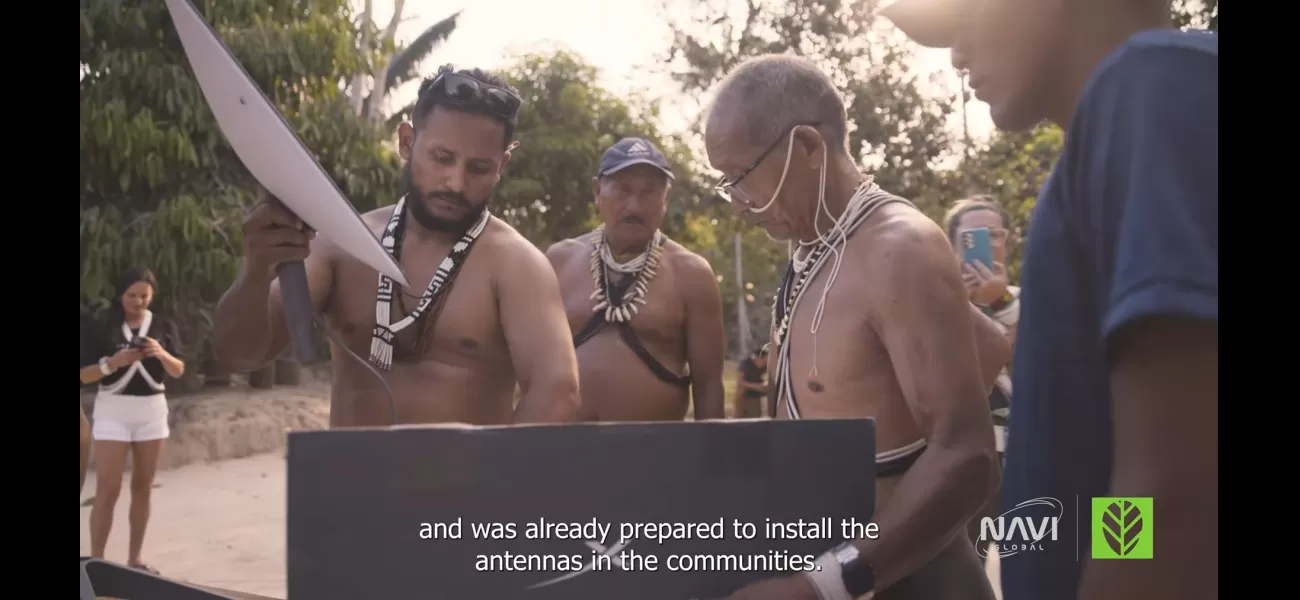A previously isolated tribe has been introduced to the internet, and the results have been interesting.
Nine months ago, the Marubo people, who reside in the Amazon, gained access to high-speed internet.
June 3rd 2024.

Last year, something extraordinary happened for the Marubo people, a remote tribe living in the depths of the Amazon rainforest. For the first time ever, they were connected to high-speed internet. It was a momentous occasion, made possible by Elon Musk's Starlink satellite-internet service, which launched in Brazil in 2022.
The Marubo people have lived in isolation for centuries, preserving their traditional way of life along the banks of the Ituí River. While they have had some contact with the outside world, they have managed to maintain their unique customs and language. However, access to the internet was something they had never experienced before.
In order to receive the Starlink antennas, several Marubo tribesmen had to embark on a journey through the thick rainforest, carrying two antennas on their backs. It was no easy feat, but after nine months, the 2,000-strong community finally had access to the internet. The New York Times recently paid a visit to see the impact it has had on the tribe.
As they arrived, they saw something that is commonplace in many parts of the world, but not in the heart of the rainforest – teenagers scrolling through Instagram, a man texting his girlfriend, and a group of men huddled around a phone, watching a football match. It was clear that the internet had brought a new level of connectivity to the Marubo people.
When asked about the change, 73-year-old villager Tsainama Marubo expressed mixed emotions. "When it arrived, everyone was happy. But now, things have gotten worse," she said. "Young people have gotten lazy because of the internet. They're learning the ways of the white people."
Despite some concerns, many Marubo people spoke positively about the benefits of the internet. They could now communicate with loved ones who lived far away, access educational resources, and share their way of life with others. It has even saved lives, as a quick call on a mobile phone can now bring a helicopter rescue in case of emergencies, such as a snake bite.
However, with the internet also came its fair share of problems. Marubo leader Enoque Marubo, who played a key role in bringing Starlink to his community, noticed that some people were neglecting their traditional duties of hunting and farming because they were constantly glued to their phones. To address this, they now only have access to the internet for limited hours each day.
Other issues have been more difficult to handle, such as scams, violent video games, graphic pornography, and addictive social media scrolling. It's a familiar struggle for many of us, but for the Marubo people, it all came at once. Alfredo Marubo, leader of a Marubo association of villages, expressed concerns about the impact of pornography on young men, noting that some had become more aggressive in their sexual behavior.
Despite these challenges, most Marubo people are grateful for the internet and its many possibilities. They acknowledge that there are both good and bad aspects to it, but overall, they believe it has brought more benefits than harm. As Enoque says, "I think the internet will bring us much more benefit than harm, at least for now."
The Marubo people have lived in isolation for centuries, preserving their traditional way of life along the banks of the Ituí River. While they have had some contact with the outside world, they have managed to maintain their unique customs and language. However, access to the internet was something they had never experienced before.
In order to receive the Starlink antennas, several Marubo tribesmen had to embark on a journey through the thick rainforest, carrying two antennas on their backs. It was no easy feat, but after nine months, the 2,000-strong community finally had access to the internet. The New York Times recently paid a visit to see the impact it has had on the tribe.
As they arrived, they saw something that is commonplace in many parts of the world, but not in the heart of the rainforest – teenagers scrolling through Instagram, a man texting his girlfriend, and a group of men huddled around a phone, watching a football match. It was clear that the internet had brought a new level of connectivity to the Marubo people.
When asked about the change, 73-year-old villager Tsainama Marubo expressed mixed emotions. "When it arrived, everyone was happy. But now, things have gotten worse," she said. "Young people have gotten lazy because of the internet. They're learning the ways of the white people."
Despite some concerns, many Marubo people spoke positively about the benefits of the internet. They could now communicate with loved ones who lived far away, access educational resources, and share their way of life with others. It has even saved lives, as a quick call on a mobile phone can now bring a helicopter rescue in case of emergencies, such as a snake bite.
However, with the internet also came its fair share of problems. Marubo leader Enoque Marubo, who played a key role in bringing Starlink to his community, noticed that some people were neglecting their traditional duties of hunting and farming because they were constantly glued to their phones. To address this, they now only have access to the internet for limited hours each day.
Other issues have been more difficult to handle, such as scams, violent video games, graphic pornography, and addictive social media scrolling. It's a familiar struggle for many of us, but for the Marubo people, it all came at once. Alfredo Marubo, leader of a Marubo association of villages, expressed concerns about the impact of pornography on young men, noting that some had become more aggressive in their sexual behavior.
Despite these challenges, most Marubo people are grateful for the internet and its many possibilities. They acknowledge that there are both good and bad aspects to it, but overall, they believe it has brought more benefits than harm. As Enoque says, "I think the internet will bring us much more benefit than harm, at least for now."
[This article has been trending online recently and has been generated with AI. Your feed is customized.]
[Generative AI is experimental.]
0
0
Submit Comment





